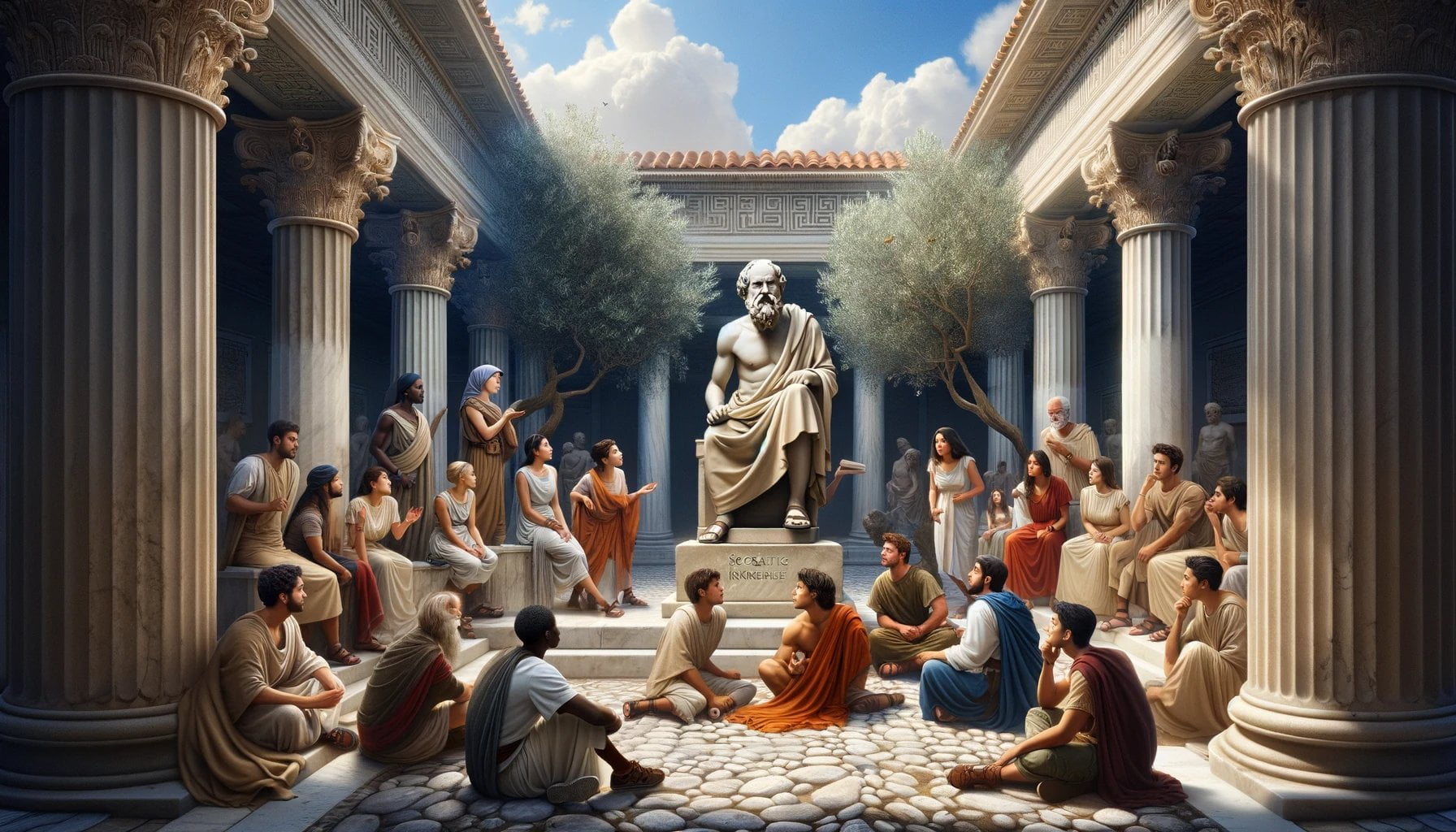In the realm of classical Greek thought, one name stands out as a trailblazer for his profound intellectual contributions – Socrates. Renowned for his Socratic dialogues, this enigmatic philosopher posed thought-provoking questions that continue to challenge us today. Among the many statements that have perplexed thinkers throughout history, one in particular stands out: “I know nothing.” But what does Socrates truly mean by this apparently contradictory claim? Delving into the world of ancient wisdom and armed with a comprehensive understanding of Socrates’ intellectual context, we embark on a journey to unravel the profound implications of his enigmatic words.
Key Takeaways:
- Socrates’ statement “I know nothing” is often interpreted as a recognition of the limits of human knowledge.
- Socrates actually says he knows “little,” not “nothing,” and his intention is to expose those who pretend to know things they don’t.
- This understanding of the limits of knowledge is referred to as Socratic wisdom, where Socrates only claims to know what he knows and makes no assumptions about knowing more or less.
- There is a debate about whether Socrates truly believed that he knew nothing, as he claims to know something and shows confidence in his claims to knowledge in certain instances.
- Socrates is one of the most famous and influential philosophers in history, known for his teaching method and famous students like Plato and Xenophon.
- Despite his impact, Socrates was executed for his criticism of Athenian democracy and refusal to renounce his philosophical beliefs.
- Socrates’ statement is meant to expose pretenders, not glorify ignorance, and his teachings continue to inspire critical thinking and self-reflection.
- Despite his execution, Socrates’ impact on Western philosophy cannot be overstated.
What does Socrates mean when he says he knows nothing?

Socrates, the renowned Greek philosopher, is often quoted as saying, “I know nothing,” or more accurately, “I know little.” This statement is often misunderstood, leading to debates about whether Socrates truly believed that he knew nothing. To unravel the true meaning behind his enigmatic claim, we must delve deeper into the context and philosophy of Socratic wisdom.
1. Socratic Wisdom: The Limits of Knowledge
Socratic wisdom, as embodied by Socrates, emphasizes the recognition of the limits of human knowledge. It is not a glorification of ignorance but a humble acceptance that true knowledge is scarce. Socrates did not claim to know everything or make assumptions about knowing more or less than what he actually knew. Instead, he focused on questioning and critically examining the beliefs and pretensions of others. By doing so, he aimed to expose those who falsely claimed to possess knowledge they did not truly possess.
2. Socrates’ Complex Understanding
While Socrates’ declaration of knowing little might initially seem straightforward, his philosophy suggests a more nuanced perspective. In Apology 29b-c, Socrates acknowledges that he does know something and expresses confidence in his claims to knowledge. This indicates that his statement of knowing nothing is not as simplistic as it appears. Socrates may have used this statement as a rhetorical device to provoke self-reflection and encourage others to critically examine their own beliefs.
3. The Legacy of Socrates
Despite his ultimate execution for his philosophical beliefs, Socrates left behind a profound and lasting legacy. He is regarded as one of history’s most influential philosophers. Through his teachings and the development of the Socratic method, Socrates inspired critical thinking and self-reflection. This question-and-answer approach aimed to stimulate intellectual inquiry and uncover truth through dialogue.
4. Conclusion
In conclusion, Socrates’ statement of knowing nothing should not be misunderstood as a glorification of ignorance. It is a recognition of the limits of human knowledge and a critique of false claims of knowledge. Socratic wisdom, as embodied by Socrates, urges us to question our beliefs and expose the pretensions of those who assert knowledge without true understanding. Despite his execution, Socrates’ impact on Western philosophy cannot be overstated, and his teachings continue to shape intellectual discourse and critical thinking to this day.
Sources:
– Daily Philosophy – Socrates on Knowing Nothing
– Daily Just Now – What does Socrates mean when he says he knows nothing
– Reason and Meaning – Socrates: “I know that I know nothing”
– The Collector – “All I Know Is That I Know Nothing”: What Did Socrates Mean?
– Wikipedia – I know that I know nothing
– Internet Encyclopedia of Philosophy – Socrates
– SparkNotes – The Apology Section 3: 20c – 24e Summary & Analysis
I know nothing except the fact of my ignorance. Find out its meaning by clicking here.
Curious to know who said “I know nothing except the fact of my ignorance”? Click here to find out more.
Explore more about the concept of my ignorance by clicking here.
Analysis of the Socratic Method and Its Relation to Socrates’ Claim
The Socratic method, renowned for its intellectual rigor, serves as a foundation for philosophical inquiry and critical thinking. Inspired by the teachings of ancient Greek philosopher Socrates, this method involves a dialogue of questioning and answering to stimulate deep reflection and challenge assumptions. At the heart of this method lies the enigmatic claim made by Socrates himself: “I know nothing.” Let us delve into the analysis of the Socratic method and its relation to Socrates’ claim, seeking to unravel the true meaning behind these words.
Unraveling the Paradox
To grasp the essence of Socrates’ claim, we must first understand that it harbors a paradox. While Socrates was widely recognized for his wisdom, he professed to know nothing. This seemingly contradictory statement invites us to explore the deeper layers of his philosophy and reflect on the nature of knowledge itself.
The Role of the Socratic Method
The Socratic method, as a vehicle for intellectual inquiry, shines a light on Socrates’ claim. By consistently questioning the beliefs and knowledge of others, Socrates aimed to reveal the limitations and ambiguities inherent in human understanding. Through thought-provoking dialogue, he instigated self-reflection and challenged individuals to critically examine their own beliefs. The Socratic method serves as a tool for unraveling the complexities of knowledge and guiding individuals towards a more nuanced understanding of the world.
Challenging Assumptions and Igniting Critical Thinking
Socrates’ claim of knowing nothing should not be misinterpreted as an assertion of ignorance. Rather, it serves as a profound recognition of the limitations of human knowledge. By acknowledging that our understanding is inevitably incomplete and flawed, Socrates encouraged a constant pursuit of knowledge and an openness to questioning existing assumptions. His teachings fostered a culture of critical thinking, enabling individuals to challenge their own beliefs and engage in intellectual growth.
A Humble Approach to Wisdom
Socrates’ assertion of knowing nothing can be seen as a rejection of hubris and a commitment to intellectual humility. In ancient Greece, where knowledge was often equated with prestige and power, Socrates emphasized the importance of recognizing the gaps in our understanding. Through his philosophical journey, he sought to convey the message that wisdom lies not in claiming absolute knowledge, but in acknowledging the vastness of the unknown.
Key Takeaways:
- The Socratic method, named after Socrates, is a form of argumentative dialogue used to stimulate critical thinking and understanding.
- Socrates’ claim of knowing nothing is a paradox that invites deeper reflection on the nature of knowledge.
- The Socratic method challenges assumptions, ignites critical thinking, and encourages individuals to examine their own beliefs.
- Socrates’ claim of knowing nothing is not a glorification of ignorance but a recognition of the limitations of human knowledge.
- His teachings emphasize intellectual humility and a commitment to a lifelong pursuit of wisdom.
Sources:
1. Socratic method – Encyclopedia Britannica
2. The Socratic Method and the Role of Philosophy – Humanities LibreTexts
Interpretation of “I know nothing” as Socrates’ recognition of his own ignorance
Socrates, one of the most influential philosophers in history, left us with a profound and enigmatic statement: “I know that I know nothing.” To fully understand the implications of this claim, we must delve into the context of Socratic philosophy and his quest for wisdom.
Socratic Wisdom: Seeking Truth through Self-Awareness
Socrates believed that the pursuit of knowledge was a lifelong journey and that wisdom lay in recognizing the limits of human understanding. His statement, “I know that I know nothing,” was not an assertion of ignorance, but rather a humble acknowledgement of his own limitations. It served as a reminder to avoid hasty judgments based on incomplete or potentially false information.
Socratic Ignorance: A Paradoxical Wisdom
Socratic ignorance, also known as “Socratic wisdom,” refers to the honest acknowledgment of what one does not know. This paradoxical concept allows for genuine learning and growth. By recognizing our own ignorance, we create space for new insights and perspectives. Socrates believed that true wisdom lay in questioning our assumptions and engaging in critical self-examination.
Unraveling the Meaning: A Subject of Debate
Throughout history, philosophers and scholars have debated the precise meaning of Socrates’ statement. Some interpret it as a call to intellectual humility and an encouragement to continually seek knowledge. Others see it as a critique of false claims of knowledge and a reminder of the vastness of the search for truth. Regardless of the interpretation, one thing remains clear: Socrates recognized the inherent limitations of human knowledge and urged others to do the same.
Key Takeaways:
- Socrates’ statement, “I know that I know nothing,” is a recognition of his own ignorance and a reminder of the limits of human knowledge.
- Socratic ignorance, also known as “Socratic wisdom,” highlights the importance of questioning assumptions and engaging in self-reflection.
- The phrase serves as a motto, discouraging hasty judgments based on incomplete or potentially false information.
- Socrates’ statement has different interpretations and has captivated the attention of philosophers and scholars throughout history.
Sources:
– The Collector: “All I Know Is That I Know Nothing”: What Did Socrates Mean By This Statement?
– Reason and Meaning: Socrates: “I know that I know nothing”
Discussion of the underlying purpose and implications of Socrates’ statement
Key Takeaways:
- Socrates believed in the limits of human knowledge and emphasized intellectual humility.
- His statement, “I know nothing,” was not an assertion of ignorance but a recognition of the vastness of the search for truth.
- Socrates used his statement as a rhetorical device to provoke critical examination of beliefs.
- The Socratic method of questioning and self-reflection encouraged individuals to challenge assumptions and engage in genuine learning.
- The precise meaning of Socrates’ statement has been debated, but it serves as a reminder of the complexity of knowledge and the importance of seeking wisdom.
Socrates, the well-known ancient Greek philosopher, left behind a legacy that continues to captivate the minds of scholars and thinkers to this day. One of his most enigmatic claims is his statement, “I know nothing.” It is essential to explore the underlying purpose and implications of this statement, delving into the depth of Socrates’ philosophy and the context in which it was articulated.
Socrates believed in the limits of human knowledge and possessed great intellectual humility. He recognized that true wisdom lay in acknowledging the vast extent of what one does not know. Socrates’ statement, “I know nothing,” was not an admission of ignorance but a profound acknowledgment of the complexity and depth of knowledge. It was an invitation to engage in deep introspection and questioning of one’s own beliefs.
The Socratic method, which Socrates developed and employed, was a powerful tool for intellectual exploration. Through a series of questioning and answering, Socrates aimed to lead his interlocutors into contradictions and expose the unfounded nature of their supposed knowledge. By challenging assumptions and provoking critical thinking, the Socratic method encouraged individuals to examine their beliefs rigorously and engage in genuine learning.
Socrates’ statement, “I know nothing,” served as a rhetorical device. By claiming ignorance, Socrates prompted his companions and students to question their own convictions and engage in self-reflection. It was not meant to glorify ignorance or downplay the importance of knowledge. Instead, it highlighted the necessity of ongoing inquiry and the pursuit of wisdom.
The true meaning behind Socrates’ statement has been a subject of scholarly debate. Some interpret it as a call to intellectual humility, urging individuals to recognize their limits and continually seek knowledge. Others see it as a critique of false claims of knowledge and a reminder of the complexity and vastness of the search for truths. Regardless of the specific interpretation, Socrates’ claim, “I know nothing,” serves as a reminder of the intricacies of knowledge and the continual pursuit of understanding.
In conclusion, Socrates’ statement, “I know nothing,” holds profound implications and serves a deeper purpose in his philosophy. It underscores the limits of human knowledge, emphasizes intellectual humility, and encourages individuals to engage in critical examination of their beliefs. Through the Socratic method, Socrates inspired a lifelong pursuit of wisdom and a commitment to genuine learning. The true meaning of his enigmatic claim may remain debated, but its impact on intellectual thought and self-reflection is undeniable.

FAQ
Q1: What is the meaning behind Socrates’ statement “I know nothing”?
A1: Socrates’ statement “I know nothing” is often interpreted as a recognition of the limits of human knowledge. However, it is important to note that Socrates does not say that he knows “nothing,” but rather that he knows “little.” His intention is not to glorify ignorance, but rather to expose those who pretend to know things they don’t. This understanding of the limits of knowledge is referred to as Socratic wisdom, in which Socrates only claims to know that which he knows and makes no assumptions about knowing more or less.
Q2: Did Socrates truly believe that he knew nothing?
A2: It is often debated whether Socrates truly believed that he knew nothing. In some instances, Socrates claims to know something and expresses confidence in his claims to knowledge. This suggests that his statement of knowing nothing may be more complex than it initially appears.
Q3: What is Socratic wisdom?
A3: Socratic wisdom refers to Socrates’ understanding of the limits of human knowledge. He only claims to know what he knows and makes no assumptions about knowing more or less. Socratic wisdom emphasizes the importance of honest acknowledgment of what one doesn’t know and allows for genuine learning and growth.
Q4: Why is Socrates known for his statement “I know that I know nothing”?
A4: Socrates’ statement “I know that I know nothing” has become widely known because it encapsulates his philosophy of Socratic wisdom and the recognition of the limits of human knowledge. It serves as a motto that discourages hasty judgments based on incomplete or potentially false information.
Q5: What is the legacy of Socrates as a philosopher?
A5: Socrates is considered one of the most famous and influential philosophers in history. His teachings, particularly the Socratic method of questioning, continue to inspire critical thinking and self-reflection. Despite being executed for his beliefs, his ideas and methods had a profound impact on Western philosophy for centuries to come.
- Star Ring Trends: Etsy vs Amazon - March 28, 2025
- Boost Pollinator Habitats: Baby Blue Eyes Sustainable Farming Guide - March 28, 2025
- Protect Big Black Bears: Effective Conservation Strategies - March 28, 2025
















